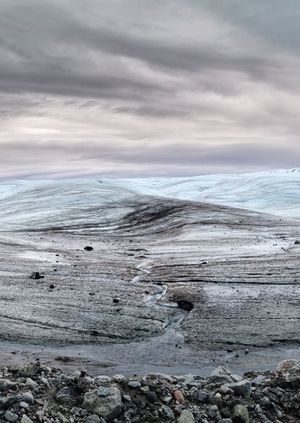
Perceiving Climate Change #1: Ice
British Summer Time
This is a live-stream event
Tickets
Event Details
How can humans notice the subtle but fundamental processes of climate change? This online event will be the first in a series of free events across 2024 in which we will examine from a range of perspectives how people are striving to make climate change intelligible to human senses and cognitive processes. Starting with an examination of how scientists, artists and others find ways to detect and narrate changes in the cryosphere, subsequent sessions will explore the challenges and creativity of noticing climate change in the realms of ‘heat’, ‘water’, and will then turn to considering the resulting (or absent) sense of a ‘climate emergency’. Hosted by the Sheffield Hallam University Space & Place Group in conjunction with the Royal Geographical Society (Yorkshire & North East Regional Committee), this series of events will foster an exploratory, interdisciplinary conversation and we very much welcome participation from all disciplines.
Abstracts
Rob Storrar (SHU, DNBE – glaciologist)
Measuring how water affects glacier changes from space and with drones
We are all familiar with images of retreating glaciers, and of icebergs calving dramatically into the ocean. But there is more to glaciology than simply noticing that glaciers are melting. As the climate warms, glaciers and ice sheets experience more and more melting, and this produces huge volumes of water that drain across, within and beneath ice. The addition of liquid water can cause glaciers to accelerate (potentially speeding up ice loss and sea level rise), but it can also cause them to slow down. Being able to predict which of these will predominate is clearly important for understanding future sea level rise. However, understanding how water moves through glaciers is a complex business, since it involves studying processes that occur beneath 100s or even 1000s of metres of solid ice. It has impacts that are felt at a huge range of scales: from centimetres to thousands of kilometres, and from hours to thousands of years. This talk will explore how we can use 3D models created from satellite imagery and drone surveys to advance our understanding about how water behaves underneath ice, based on ongoing projects in Iceland and Greenland.
Niall Gandy (SHU, DNBE - Palaeo-glaciologist)
Ancient to Modern, Digital to Physical: Connecting the Dots of Ice Sheet Science
Greenland and Antarctica are facing gargantuan change over the next century as we warm our climate. We are pushing these ice sheets away from many millennia of remarkable stability, towards collapse at an uncertain rate. It is obviously important to understand the magnitude and pace of this change. One way to reduce our uncertainty is to study ancient ice sheets of the last ice age, examining periods of rapid change help us better predict future behaviour. At Sheffield Hallam University we have been running computer simulations of these ancient ice sheets, and have reproduced ancient “instabilities” – collapse events which could cause rapid sea level rise over the course of just a few decades. This work can help us improve the accuracy of simulations predicting future change, but actually joining together the perspectives (from ancient ice sheet to future change, and from digital simulations to real physical change) is an outstanding challenge. This talk will examine which barriers still exist, how they can be removed, and the potential benefits of doing so.
Haukur Ingi Einarsson (Founder, glacieradventure.is)
How can an Icelandic glacier guide’s perspective on glacier change, climate and sustainability make a difference?
Visiting a glacier is a unique and special experience, and one that thousands of tourists are able to do each year in locations around the world. However, a single visit to a glacier can make it hard to understand how they are changing. This talk provides the perspective of the owner of a glacier guide business (Glacier Adventure) in SE Iceland. The talk will explore the daily-seasonal-annual changes that can be observed when visiting glaciers regularly, and the longer timescales and experiences of living with glaciers. It will also explore how glacier tourism can be used as a powerful educational tool, and stimulus to help people to think more about climate change, and why they might want to try to live more sustainably.
https://glacieradventure.is/team/haukur-ingi-einarsson/
Lise Autogena (SHU, Professor of Cross-disciplinary Art / Director
of Narsaq International Research Station (NIRS), Greenland)
Greenland – what next? Local Perceptions of the retreating ice.
In Greenland, the melting glaciers is already impacting on traditional ways of life and Greenlanders are experiencing a huge influx of climate researchers from around the world who come here to understand the wider impacts of the changes to the arctic climate. The melting ice also drives a growing international interest in Greenland as a site for exploitation of natural resources, in particular the mining of minerals critical to the global energy transition away from fossil fuels. This growing geo-political importance is perceived by many Greenlanders as an opportunity for diversifying local income sources to build financial independence for a new decolonised Greenland. However, many in Greenland are also concerned with the potential impact of international mining activities on the fragile arctic ecology, which could have long-term consequences for the Inuit way of life. This talk will focus on local perceptions in South Greenland, where a legal dispute with an international mining company is currently threatening to destabilise the entire Greenlandic economy, raising concerns about the country’s vulnerability in dealing with geo-political interests.
Image Credit: Rob Storrar